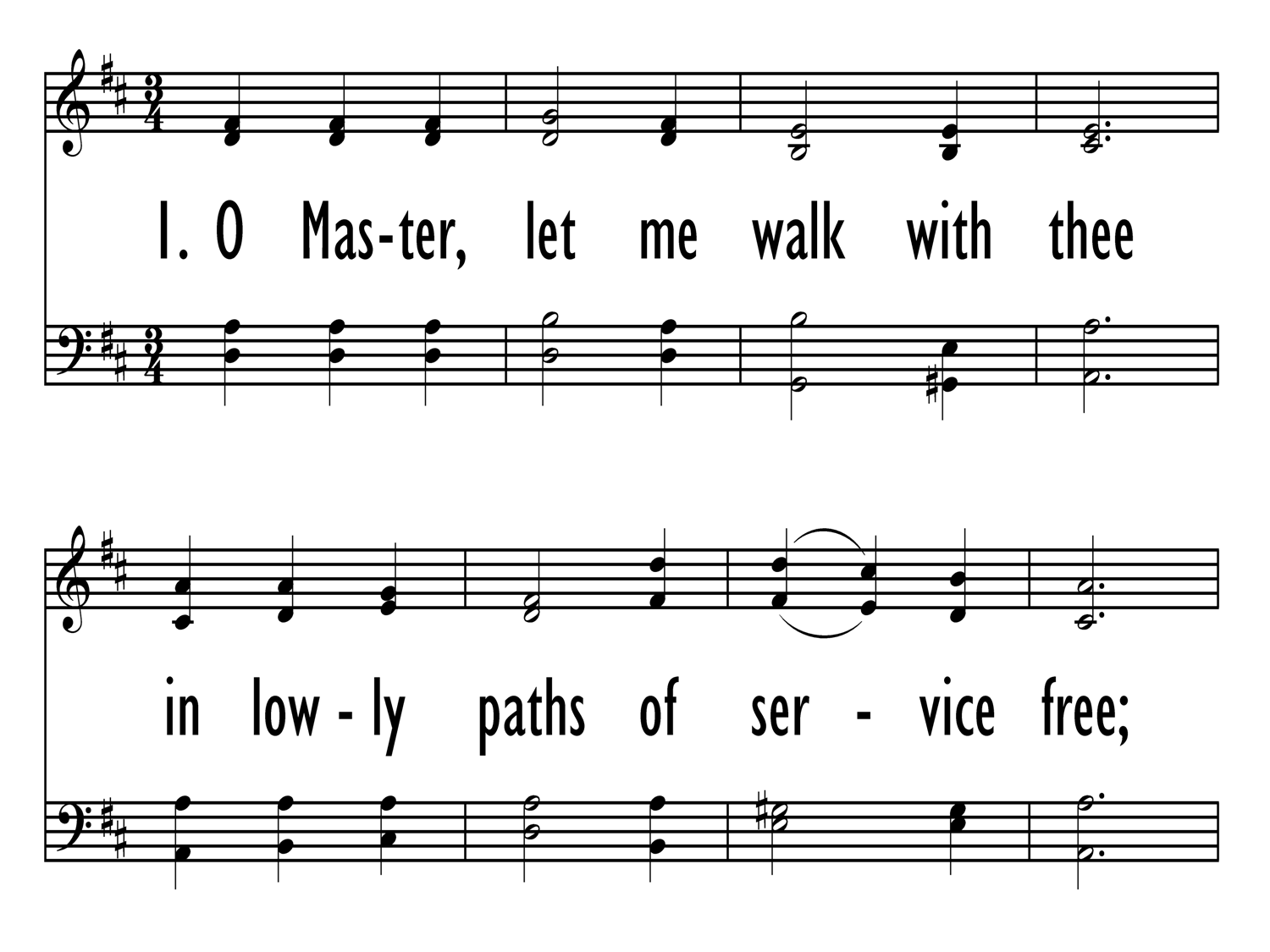- |
User Links
325
O Master, Let Me Walk with Thee
Hymn Information
- First Line
- O Master, let me walk with thee
- Author
- Washington Gladden, 1836-1918
- Tune Name
- MARYTON
- Composer
- H. Percy Smith, 1825-1898
- Topic
- Discipleship · Walk with God
Copyright Information
- Text Copyright
- Public Domain
- Tune Copyright
- Public Domain
- Reprint/Projection Information
- Words and Music: The Words and Music are in the Public Domain; you do not need permission to project or reprint the Words and Music.
Full Text
Scripture References
Thematically related:
- st. 1 =
- st. 3 =
Confessions and Statements of Faith References
Further Reflections on Confessions and Statements of Faith References
Stanza 3 is a petition that we may be taught the patience of Christ. Similarly, Our Song of Hope, stanza 10 points out the need for God’s children to be filled “with the patience of Christ.”
325
O Master, Let Me Walk with Thee
Tune Information
- Name
- MARYTON
- Key
- D Major
- Meter
- 8.8.8.8
Recordings
325
O Master, Let Me Walk with Thee
Hymn Story/Background
Washington Gladden wrote the original poem from which this text was taken. It was published in three long stanzas in the magazine he edited, The Sunday Afternoon (March 1879), with the title “Walking with God.” Gladden explained that his poem "had no liturgical purpose" but was intended as "an honest cry of human need, of the need for divine companionship."
Interestingly enough, this meditative text on Christian service (with a gentle quality confirmed by the use of the MARYTON tune) is the work of a man who, by the end of the nineteenth century, was considered to be a powerful spokesman and activist for the liberal "social gospel."
Charles H. Richards revised stanzas 1 and 3 of Gladden's poem and published them as a hymn text in four shorter stanzas in his Songs of Christian Praise (1880). Richards's revision appears in most modern hymnals. The text emphasizes that an intimate walk with God is expressed in Christian service to our neighbors: in bearing burdens (st. 1), in actions of love and patient leadership (st. 2-3), and in striving for hope and peace (st. 4).
After various tunes had been set to this text, Gladden insisted on the use of MARYTON. Composed by H. Percy Smith, the tune was originally published as a setting for John Keble's "Sun of My Soul" in Arthur S. Sullivan's Church Hymns with Tunes (1874).
MARYTON is a serviceable but generic nineteenth-century hymn tune; its wide-ranged melody reaches a high point in the middle phrases. Sing the first and final stanzas in unison and the middle stanzas in parts. Because textual and musical phrases are often at odds with each other in this hymn, a competent choir may aid the singing by following the punctuation and not breathing in the middle of textual phrases. Keep the tempo moving!
—
Bert Polman
Author Information
Ordained in 1860, Washington Gladden (b. Pottsgrove, PA, 1836; d. Columbus, OH, 1918) was a Congregational minister who served churches in New York, Massachusetts, and Ohio. He gained national prominence during his pastorate at the First Congregational Church in Columbus, Ohio (1882-1914), because of his advocacy of the church's strong role in issues of social justice for the laboring people and because of his use of modern methods of biblical criticism. Educated at Williams College, Williamstown, Massachusetts, Gladden edited the New York Independent and was one of the editors of the Pilgrim Hymnal (1904). Included in his many writings are The Christian Way (1877), Applied Christianity (1887), Christianity and Socialism (1905), and a fascinating essay, 'Tainted Money" (1905), in which he criticized his denomination for accepting a $100,000 gift from Standard Oil’s Rockefeller.
—
Bert Polman
Composer Information
Henry Percy Smith (b. Malta, 1825; d. Bournemouth, Hampshire, England, 1898) was educated at Balliol College, Oxford, England, and ordained a priest in the Church of England in 1850. He served five churches, including St. Michael's York Town in Farnborough (1851-1868), Great Barton in Suffolk (1868-1882), Christ Church in Cannes, France (1882-1892), and the Cathedral in Gibraltar (1892-1898). MARYTON is his only tune found in contemporary hymnals and is thought to be the only tune he published.
—
Bert Polman
Suggestions or corrections? Contact us


 My Starred Hymns
My Starred Hymns






